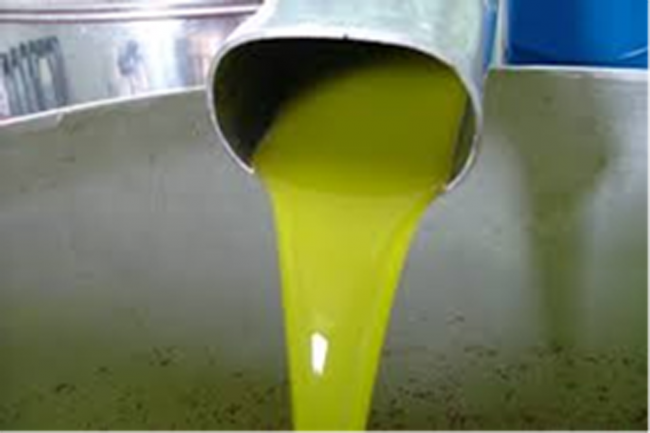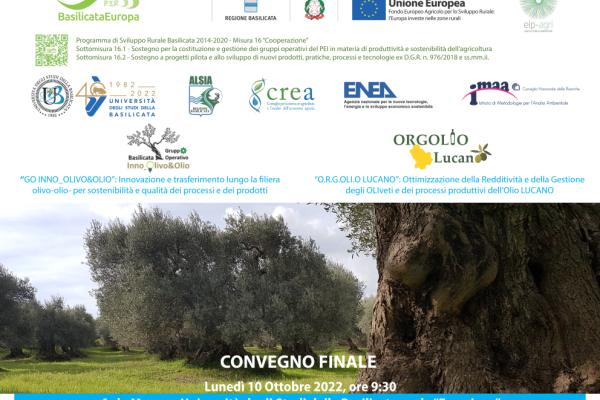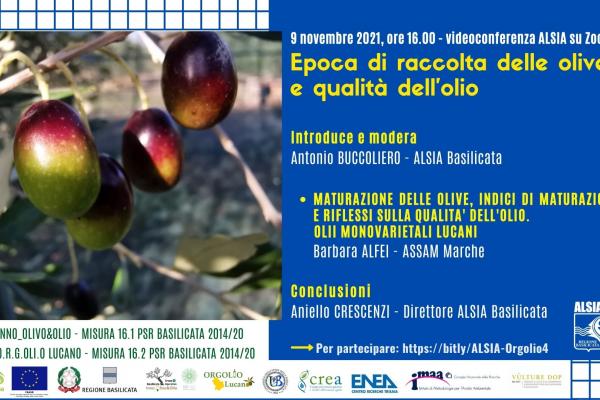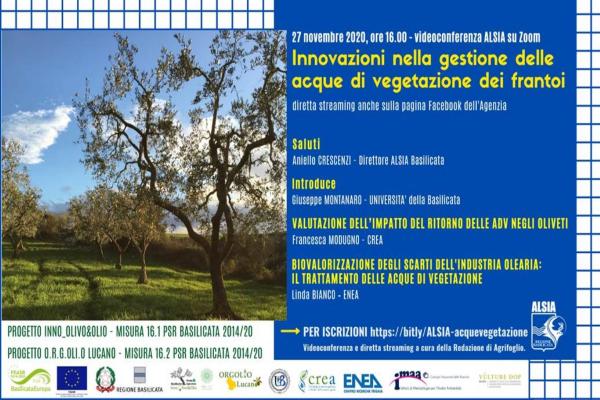Innovation and transfer in the olive oil sector for sustainability and quality of processes and products

In the new rural development program, there is a need to act on the advances to improve the competitiveness of olive cultivation through the adoption and development of innovative olive oil models that reduce production costs, giving new impetus to the use of new cultivars (also recovering and improving existing ones) and leading to the rise of the quantitative character of the product.
The project intends to apply innovations to:
- reduce field production costs;
- reducing the environmental impacts of cultivation in the field, of the processing into a crusher;
- increase the quality standards of products (olives and oil);
- increase the production of olives per hectare.
Quality research will begin with field innovations with the application of DSS to facilitate the various cultivation operations and plant protection until the mill is reached (grinding and pressing).
Product bottle conservation should be improved to maintain the organoleptic properties and typical smell of the oil over a period of 18 months.
Lastly, a scouting activity will be set for the mill's wastewater management innovations to identify and therefore address a problem and, if possible, increase the competitiveness of the practice with respect to current management.
Lucan olive cultivation is largely based on traditional olive groves characterized by high production costs, poor productivity, marked production alternation, and difficult adaptation to mechanization. These olive groves are maintained and preserved in the future not only for reasons of preservation of the local heritage, but also for cultural and landscaping purposes and for the rule of the land, above all hilly. The problems of traditional olive groves can be attenuated and partly solved using the knowledge available today that allows rationalization of grass (breeding, pruning), soil, fertility and water resources management.
The need to "communicate" and promote Italian excellence oils is a long-lasting goal that continues to be very important, but the work team stresses how important it is to make the consumer and the various potential users aware of the value Of oil other than the extra virgin, as a profitable source for the Italian areas rich in secular olive trees, and the potential for market outlets for by-products, even for energy use.
With the growing interest in food security issues (from the nineties), Community industry legislation has attempted to identify tools and methods to ensure the consumer with regard to the quality and the chemical characteristics of olive oil marketed , But it has also been strongly directed towards ensuring the origin and quality of the raw material. Against this aim is also the discipline of the designation of origin, which makes it possible to identify with certainty the origin of the olives and the place of their transformation, linking to the geographical name the set of natural and human factors and the processing techniques which definitely affect the Oil characteristics.
Applying Innovative Techniques for Correct and Sustainable Management. Aims:
- Transfer of innovations to increase the profitability of olive groves;
- Increase the fertility of olive groves;
- Improve product quality on the field, increasing its yield.
The activities envisaged in the OR2 will be developed on the following main lines:
- soil management, intended as the control of the weeds, humidity and fertility (nutrients and organic matter). Special attention must be paid to the erosion processes, the need of reduction of chemical inputs and the optimization of water use;
- pruning management in order to maximize production and product quality and reduce the final costs;
- nutrition management to reduce nutritional deficiencies and promote production;
- the enhancement of the environmental function of olive groves with a landscape function (certification and sequestration of CO2).
Results
Through OR2, using the results of scientific researches already available in the literature, it will be possible to educate the olive growers to manage the olive groves in sustainable manner. This includes workshops, seminars and visits to regional and extra regional pilot camps when the effectiveness of sustainable management could be ascertain.
In addition, the standard management protocols will be created to share with farmers in order to correct the existing nutrition management and improve productivity, product quality and agroecosystem services provided by olive cultivation.
Finally, the impact on the environment of the various olive management systems will be determined in order to induce the olive grower to marry sustainable farming techniques and at a low environmental cost.
Applying technologies and updating oil mill processes to improve oil quality. Objectives of the A3 dedicated to the transformation phase are:
- to innovate the process of transforming olives into oil through the use of advanced machines and / or techniques;
- to control the quality of the initial product in field and to transfer it to the oil;
- to extend the continuous olive processing technique (focus on grinding and pressing);
- to achieve the highest quality standards of the oil product;
- to ensure the quality retention during the shelf life (at least 18 months).
Activities
Innovations in mechanical extraction process of virgin olive oils must be lead to the improvement of the quality and extrinsic characteristics of the oils.
Closely related to the transformation phase, the following activities will be undertaken:
- Adoption of continuous olive processing technique and creation of closed production cycle (energy saving);
- Monitoring of product quality along the transformation chain (low cost analysis tools);
Through A3 it is expected:
- an increasing of the average quality of product on regional scale, which would lead to an increase in the price of final product (oil);
- a homologation of the productive and transformation processes to ensure the maintenance of final product quality.
- an update of olive oil processing techniques to eliminate the defects presented in traditional processes;
- an achievement of the highest quality standards for the oil products.
- an optimization of the oil packaging for better preservation and maintenance of quality.
Optimization of the management for oil reflux.
The objectives of the A4 dedicated to the transformation phase are:
- To identify the innovations useful for optimizing the management of oil reflux (vegetation waters).
- To find the technical solutions for a possible recycling of oil reflux.
Activities
The A4 will soon undertake an important worldwide scouting activity for innovations in wastewater management (sewage and vegetation waters). New machines, more instrumentation efficiency, reuse or recycling potential will be identified to find a solution to the problem by providing added value to them and possibly increasing the competitiveness of the practice compared to current water spill (by reducing the legislative risks that come from inapropriate oil reflux management).
Expected results
Through A4 we expect to:
- apply technological solutions for the management of oil reflux (without violating current legislation);
- solve problems with the management of oil reflux (reducing volumes, extracting useful fractions, facilitating disposal or directing products to recycling).
- to define new possibilities for disposal on agricultural land (de-calendarized).
| Titolo/Descrizione | Url | Tipologia |
|---|---|---|
|
Sustainable agriculture in Basilicata Region
|
Materiali utili
|
|
|
Sustainable agriculture in Basilicata Region
|
Materiali utili
|
|
|
Sustainable agriculture in Basilicata Region
|
Materiali utili
|
|
|
Università di Perugia (food quality)
|
Materiali utili
|
|
|
ENEA
|
Materiali utili
|
|
|
OLIOVULTURE
|
Materiali utili
|
|
|
Relazione scientifica conclusiva
|
Materiali utili
|


